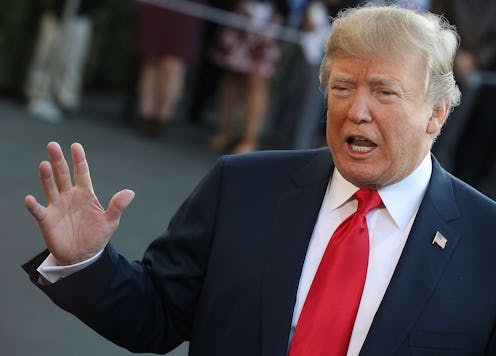News
Trump Says He Believes Putin's Claims That Russia Didn't Interfere In The Election

During his visit to Vietnam on Saturday, President Trump told reporters he's done talking about Russian interference in the U.S. election. When asked if he brought it up with President Vladimir Putin, Trump said he believes Putin's denials about Russia's election meddling, and the Russian leader was "insulted" by the question.
"He said he didn't meddle," Trump said to reporters. "He said he didn't meddle. I asked him again. You can only ask so many times. Every time he sees me, he says, 'I didn't do that.' And I believe, I really believe, that when he tells me that, he means it. I think he is very insulted by it."
Trump's statements contradict those from U.S. intelligence agencies that concluded with "high confidence" that Russia acted covertly to hurt Hillary Clinton's chances during last year's election. Both the CIA and the FBI have determined that Russians hacked the Republican National Committee's computer systems in addition to giving Democrats' documents to Wikileaks, including over 30,000 emails from Clinton's private email server, ahead of the election. An investigation is currently underway to assess the scope of Russia's interference and to determine if Trump's team colluded with the Russians or attempted to obstruct the FBI investigation.
During his conversation with reporters on Saturday, Trump also slammed U.S. intelligence officials in charge of the Russia investigation, including former CIA director John Brennan, former director of national intelligence James Clapper, and former FBI Director James Comey.
"I mean, give me a break, they are political hacks," Trump said. "So you look at it, I mean, you have Brennan, you have Clapper and you have Comey. Comey is proven now to be a liar and he is proven now to be a leaker. So you look at that and you have President Putin very strongly, vehemently says he had nothing to do with them."
Trump has denied any collusion with the Russians after the investigation, led by special counsel Robert Mueller, was broadened to focus on possible financial crimes in addition to the possibility of Trump's team illegally coordinating with Russian spy agencies. Trump's former campaign chairman Paul Manafort and former business associate Rick Gates were indicted last week for charges of money laundering, conspiracy against the U.S., and other charges. Another former Trump adviser, George Papadopoulos, pleaded guilty in October to lying to the FBI on trying to get "dirt" on Clinton last year.
Trump has called the investigation a "Democratic-inspired thing" and a "pure hit job." He has repeatedly insisted that there is no collusion between his campaign and Russian officials, and has reportedly grown angry over the investigation, even saying in July that "other countries" besides Russia could have been involved in the interference.
"Everybody knows there was no collusion," Trump said on Saturday. "I think it's a shame that something like that could destroy a very important potential relationship between two countries that are really important countries."He added he thought that Putin and he could "have the potential to have a very, very good relationship."
On Saturday, Mueller's team began questioning Sam Clovis, former co-chairman of Trump's campaign, to assess what Trump knew during the campaign, according to Reuters. Clovis is the White House adviser to the Agriculture Department and has already testified before a grand jury in Mueller's investigation. Clovis is being questioned after court documents revealed that Papadopoulos told Clovis last year about Russian representatives who could arrange a meeting with then-candidate Trump and Putin.
“The ultimate question Mueller is after is whether candidate Trump and then President-elect Trump knew of the discussions going on with Russia, and who approved or even directed them,” a source told Reuters. “That is still just a question.”
The relationship between the U.S. and Russia have been fraught with tension over the last year. In July, the Senate passed a bill imposing sanctions on Russia; in response, Russia cut down on the number of U.S. diplomats. Trump then reluctantly signed another sanctions bill, limiting trade, in August. He called the legislation "seriously flawed" for not allowing the executive branch to negotiate the terms of the bill.